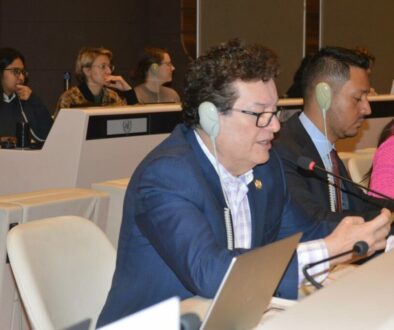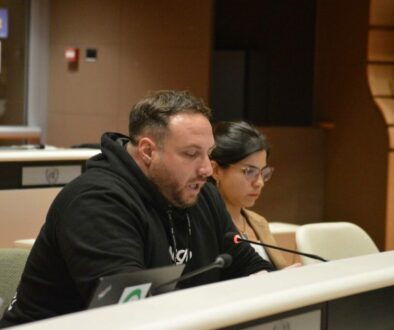From the UN to the world: Parliamentarians stand against genocide and corporate impunity
Geneva, Switzerland – 20 October 2025
Inside the halls of the United Nations and out on the streets of Geneva, the Global Interparliamentary Network (GIN) delegation once again made its presence felt. Lawmakers from Africa, Asia, and Europe gathered for the 11th Session of the UN Intergovernmental Working Group on Transnational Corporations and Human Rights to push for an effective Binding Treaty that ends corporate impunity and ensures that human rights come before profit.
In a global context marked by the rise of fascism and the sharpened claws of transnational corporations, this delegation stands as a sign of hope for the peoples. Parliamentarians who challenge corporate impunity in all its forms, and who work actively in their regions to develop effective legislative frameworks to make these corporations accountable, while advancing the global fight for international binding rules.
From Pan-African struggles for justice in South Africa, to resistance against repression and corporate plunder in the Philippines, or in the pushback against deregulation and militarization across Europe, these parliamentarians form a united front to secure a strong and effective Binding Treaty capable of holding transnationals accountable for their human rights violations.
“We need the LBI on TNCs to prevent these corporations from taking advantage of the globalization of production and service delivery in order to export and subcontract to firms in other nation-states their violation of workers rights, including child and other forced labor and degradation of the environment. Globalization of corporate power must be countered with globalization of legal accountability and liability through the LBI on TNCs.”
— Haima K. Ismula, Member of Parliament, Philippines“It is time, ten years is enough. While they delay, corporate irresponsibility grows through illicit financial flows, tax injustice, exploitation, and the ongoing genocide in the Congo. We call on African governments to unite again, as they did for the UN Tax Convention. South Africa, which was the one that pushed for Resolution 26/9, should take a more active role. This treaty must go to the General Assembly for the dignity and survival of Africa, not corporate interests.”
— Khanyisile Litchfield Tshabalala, Member of Parliament, South Africa““The presence of Left MEPs is needed to accelerate the conclusion of a binding UN treaty on business and human rights, by promoting coordination between international parliamentarians and civil society actors. We will do everything we can to end corporate impunity for human rights and environmental violations everywhere, in Palestine, the DRC, Sudan, and around the world.”
— Rima Hassan, Member of the European Parliament, France“We are in Geneva to support a binding UN treaty on transnational corporations and human rights. As a former factory worker, I witnessed corporate impunity firsthand. While businesses profit from the weakening of workers’ rights and environmental protections, the EU pushes for further deregulation of social and environmental legislation. The Left is committed to continue campaigning for corporate accountability.”
— Rudi Kennes, Member of the European Parliament, Belgium
Beyond the negotiations, the GIN delegation joined movements and communities in different events:
1. March against multinationals complicit in genocide – Place des Nations (19/10)
Under the banner “Peoples over Profit – Multinationals Complicit in Genocide,” thousand marched through the streets of Geneva to denounce the role of corporations such as Chevron, BP, Microsoft, Amazon, and Glencore in sustaining Israel’s occupation and genocide against the Palestinian people. The demonstration exposed how these firms profit from arms trade, digital surveillance, and energy projects that fuel apartheid and dispossession. GIN parliamentarians joined the march to express solidarity with the Palestinian resistance and to demand binding sanctions and accountability for corporations complicit in genocide.

2. Public Event: “Corporate Profiteering in Palestine: Why We Need International Rules to End Corporate Impunity?” (29/10)
In a vibrant discussion bringing together lawmakers, movements, and communities from every region, participants highlighted how the global economy has become complicit in colonialism and genocide. The GIN delegation called for stronger cross-border alliances between people’s movements and progressive legislators to push for binding international rules that hold corporations accountable, especially in the context of genocide.

3. Side Event during the session: “Corporate Complicity in Genocide and Atrocities – Confronting Impunity and Corporate Capture through the Binding Treaty Process & Beyond” (30/10)
This session explored how corporate capture and economic interests fuel mass atrocities, and how the Binding Treaty process can serve as a platform to reclaim international law from the grip of transnational capital.

The GIN stands as a living example that resistance inside institutions can serve the peoples’ struggles. Its continued presence in Geneva shows that, from across the world, we move forward collectively towards the end of corporate impunity



